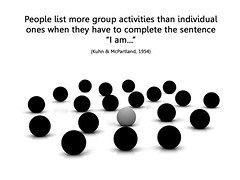
If I Had Something to Say by re_birf
Attribution License
This week we’ve been asked to jot down / sketch / brainstorm some ideas about our final design project. I was pretty stumped for a while, and I’m still not sure I’ve really got any ideas. I have several jotted down in my (paper) notebook and have been letting them “sit” in my mind for the last 4 or 5 days. Generally they all come back to writing and how to make it more of a social, interactive experience. Basically, I am uncomfortable (always have been) with the stereotypical image of “writer in solitude.” While I agree that at times one can write better when sitting alone, I also think good writers can emerge from a supported community. It takes some balance. I’m not really keen on teaching / instructing people how to become better writers in solitude. I’ll leave that for Sark, Natalie Goldberg, and Julia Cameron. I’m much more interested in how to capitalize on the hive mind and create some solid pieces of Writing For The People.

i am by Will Lion
Attribution-NonCommercial-NoDerivs License
Robert Scoble tried a variation of this using FriendFeed and Twitter, but I am much more interested in the idea of having some kind of platform that makes this all possible — that your audience can give you feedback as the ideas are being generated, and that parts of the writer’s words can be shared, and critiqued, before the piece is “finished.” Or perhaps the piece is never finished? I’d like there to be some element of audio / video, as well, so that users can comment this way and so that the focus is not entirely text-based. I basically want writing — that is, communicating via text — to not be as laborious and text-heavy as it is now. In order to blog these days, you have to be pretty text literate. And while that is fine for those of us who are verbal and educated, what about twelve-year-olds who have something to put out into the world, who want to refine their writing, but want some help and interaction to make their writing really phenomenal?
Perhaps I’m thinking too grandiose at the moment…
What’s been sticking out to me when reading Saffer, Sharp, Norman, and Adams is how important it is for the affordances of the interface to be almost instinctual, or intuitive. I also am intrigued by the feedback/ feed-forward ideas Saffer discusses in Chapter 7; it is striking to me how few programs / platforms incorporate this. The key, I guess, is to have everything seem simple to the user but in reality the complexity is all hidden from the user. Which has got me thinking — if it is intuitive to me, how will I know it is intuitive to others? Saffer in particular talks about how so many designers design things for other designers, and how this is just not cool. I have to agree. So I am wondering — hoping? optimistically? naively? — that not being a designer myself or having that background will actually be an advantage in this particular project. Or is that what every designer thinks when they first start out… ? 😉 I suppose it comes back to what we’ve been learning in every course so far — a tenet that is fundamental to educators in general — know your user. Do research, talk to them, study them, find out how they will use things, how they think. This reminds me also how intrigued I was about all the user research that went into Quest Atlantis, having read about this for a different course. Knowing your user is key, and I suppose one cannot assume ever that they are just like oneself! 🙂
I have to admit that I’m really also loving the ideas of one of my classmates, Poukhan. Check out her ideas. I am tempted to scrap my interactive writing idea altogether and ask if I can join her!



